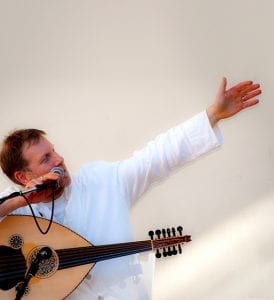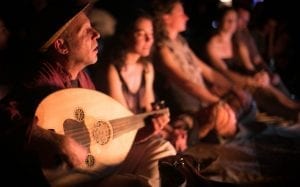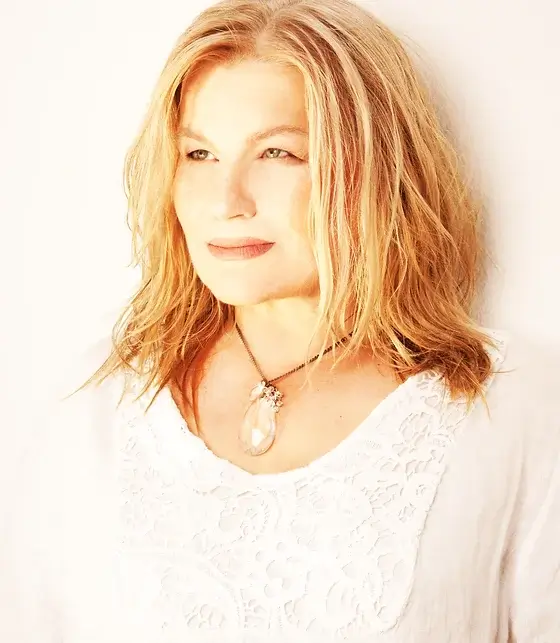Interview by Kara Johnstad
This interview was originally published in the April 2019 OMTimes Magazine and is republished here with permission.
I have with me in the studio the world-renowned musician, composer, educator, producer, and peace activist Yuval Ron for a discussion about divine attunement and sound consciousness. Yuval Ron began composing professionally for theater and contemporary dance in Israel in the early 1980s. In the late 80s to early 90s, he worked as a composer for promotional videos, theater, television, and dance in Boston and New York. He scored his first feature film, Urban Jungle, produced in New York, in 1990. In the mid to late 90s, Yuval Ron was a composer for the Fox Kids network in Los Angeles, CA. In 2006, he composed music for the short film West Bank Story, a musical spoof of West Side Story that features two rival gangs of fast food employees, the Israeli “Kosher King” vs. the Palestinian “Hummus Hut”. West Bank Story won the Academy Award for Best Live Action Short Film in 2007. Other notable scores include scores for PBS Nova (“Breaking the Maya Code”), Proteus, Oliver Twist, The Spiral Staircase, Golda’s Balcony, and Road to Victory. Among Yuval’s many honors, Yuval was invited to perform for the Dalai Lama and has collaborated with the Sufi leader Pir Zia Inayat Khan and the master musician Omar Faruk Tekbilek.
Kara Johnstad: Yuval, your first book, Divine Attunement: Music as a Path to Wisdom, won the gold medal for the best book in the spirituality category at the Indie book awards. I feel blessed to have you here with me.
Yuval Ron: Thank you. It’s wonderful to talk to you, Kara, as always, because we have a conversation from the inside, as you are a musician. You know what I’m experiencing and what I’m talking about so it’s great to have this exchange of ideas.
Kara Johnstad: I love your music, and I know you have many fans in Europe. Now I think you have even more fans because I’ve been listening to your music over the last months, and there’s such a healing quality. It’s not just serene; there’s a rhythmic pulsation. They are such diverse woven tapestries. I wanted to start in a different place today, this interview: a dream seems so ethereal, and yet a dream, if it’s remembered and manifested, creates millions of opportunities. So today I would like to start with your dream. Can you name the dream that you carry within you for our world, where your music is in that dream for our humanity?
Yuval Ron: Yes. I used to say to many of my friends that I feel very fortunate, because I realized all my dreams. I have been very lucky and very fortunate. Dreams that I have had since I was a teenager, I managed to realize in this lifetime.
I am in my mid-50s, and I felt that when I was 40, and one great dream still is on my list. It’s not about my personal life but the life of humanity, it’s about the world, and it’s about peace. So that’s the one dream that is on my lap, and that’s what I’m focusing on, and I’m trying to address that—and not just in my work as a peace activist.
I created the Yuval Ron Ensemble, with musicians and dancers from the Muslim and Jewish and Christian faiths. We have been working together for 20 years, touring the world and teaching and performing, ensuring that we can create more harmony and more beauty when we work together, when we respect each other and our musical and sacred traditions, our poetry and music and sacred dance.
So, I’ve been doing this work which is specifically addressing peace in the world and encouraging dialogue, and I’ve done that not just in the Middle East. I went to Korea, and I’ve done peace projects with the Korean governments on the border between South Korea and North Korea.
I have done the same in India, and Cuba. It was about bringing people together.
I became involved in music healing and healing sounds, and that is, for me, work on this same dream. It is about bringing peace to this world, through healing the mind and the body. We are doing that through contemplative music, meditative music that is rooted in the medical traditions of China and India and neuroscience. Music therapy studies come mostly from the West, and so it’s based on both Eastern and Western wisdom traditions, science and ancient shamanic wisdom. This combination is meant to create inner peace in each listener, and through that, I hope to achieve peace.
One more element in my work to try to promote that one last dream is a charitable foundation that I founded, called the Inspired Sound Initiative.
The Foundation has its base in Los Angeles, but it’s working all over the world. It’s about bringing education thrugh music, dance, and storytelling to schools that have no arts programs, in difficult neighborhoods and struggling communities where the youth are at risk. We are trying to inspire those communities to rise above the difficult reality, like a lotus flower that grows out of the mud: that is the dream.
Kara Johnstad: A dream that I think is feasible. I think that it takes courage to speak, to say “I believe”, and live world peace. You have had many experiences with different mystery schools: we have the shamans in South America, the Sufis, and many others that work with sound. Would you like to share a little bit more about what it’s like to gain that wisdom from ancient practices?
Yuval Ron: Yes, the Sufi tradition from India is a very rich, very interesting lineage. I’ve been involved with the order of a saint that lived in India—in Europe and North America it’s called the Inyati order—that started about a hundred years ago, with a great teacher who was also a master musician. He came to America and Europe and gathered many followers all over the world. His grandson is the leader of the order right now. He became a friend of mine and a collaborator back in 2004, and since then I’ve been involved with their teachings and their work. I have studied some of the works of his grandfather, who wrote a classic book called The Mysticism of Sound and Music.
The book was a cult classic in the 60s, influencing John Coltrane, Carlos Santana, and many other jazz musicians. In a way I see my book Divine Attunement as a continuation of his book about the mysticism of music: Sufism that developed for hundreds of years in India finally came to the West.
I studied the Jewish Kabbalistic rabbis as well. Their practice goes back to 11th century Egypt, where there was an ecstatic Kabbalistic rabbi named Rabbi Abraham.
Kara Johnstad: Yuval, talking about sound healing and the mystery schools: because the sound is so powerful, and mindfulness can also be such a powerful place; do you think this is why these tools were kept a secret? For example, if somebody who is the enemy or is perhaps not conscious, sees such powerful tools, that it might bring more harm than harmony to our world?
Yuval Ron: Yes, part of the reason that it was kept a secret is that people could get hurt—and some people did. Some people lost their minds, some people got injured, both body and mind, and the teacher had to sort out who is responsible, because any tool can be used for good or for bad. Television can be a wonderful educational tool too, but television can be a horrible tool. The same is true of sound healing. Teachers had to select pupils that would use it responsibly and respectfully, and I still say this to my students when they come to study with me.
Kara Johnstad: So we’ve sensed that there is a shift happening on planet Earth, and I see that across the board. I see that with Native American teachers here in America, teaching traditions and wisdom that, in the past, would be entrusted only to four people from the tribe, but are now taught to those who are not even part of the tribe or Native American at all. I see it among the Sufi traditions as well. They are opening up because there is a sense of urgency.
Yuval Ron: Yes, we have to respond to the crisis of the planet. We must respond with the end of these separations between men and women and young people and old people and people from different nations, different tribes; all these separations are old world. It’s irrelevant now. Now is the time. We all must unite because we all must work together to deal with the crisis of the planet. The planet cries out under the abuse, mismanagement, and mishandling by humans. It is becoming a catastrophe.
Kara Johnstad: And is that the heart of unity?
Yuval Ron: Yes. Unity is crucial. We must work together to come up with smart solutions to harmoniously living on Earth.
Kara Johnstad: So, everything is receiving and giving, everything alive has a sound, has a pulsation, has a rhythm. We are relating to the planet Earth and to each other. It doesn’t matter if you are 40 or 20, man or woman, black or white. We are all pulsating, magnetic, beautiful electric beings. We are connected with every single thing that is alive on this earth.
Yuval Ron: Yes, it’s all vibration, and the universe is like a soup. In a soup, we are all particles; each one of us has a different vibration, and we all affect each other. Every little thing that is going on affects the molecules of air around it, and every cause has an effect, and every action has a result. We don’t see it because our brain was driven by evolution to slice reality to pieces and to see things as separate. It is because it is for personal survival. Life and death are one continuum.
In all the traditions of contemplations and ecstatic practices those practices were done in a group, under the supervision of a master. You had to have somebody hold the space, supervising and navigating the ecstatic, so in those practices, the teacher often does not get ecstatic with the students or followers. The teacher watches and cares for the health of all the other human beings in the room, or the field, or in the mountains.
In tribal and shamanic cultures, some ceremonies were taught to reach those ecstatic practices, but it would be a special occasion. They are not meant to be done all day, every day, because people had to hunt, had to maintain their camp. The reasonable thinking mode doesn’t allow us to feel the deep connection and unity between and amongst all things, so we are alienated from an aspect of ourselves and of the universe. The universe is unity expressed through variety. What we see is variety; what is hidden is unity. They are missing the unity.
Kara Johnstad: Yuval, in your music there’s an amazing sense of unlimited expansiveness. I can stream your music from an MP3 player and yet there’s an expansive open possibility that’s there. Do you feel that there are always new musical sounds or ways that you approach music? Can rules be broken?
Yuval Ron: I see what you are describing. I like layered, rich sound. Sometimes I compose with just one instrument. For example, on the album Voyage to the Chakras, the whole third chakra is just one solo cello, and it’s beautiful and powerful. Sometimes just one instrument is all that is called for, and sometimes a whole symphony is called for, or many, many layers of electronic sounds and acoustic sounds together. I’ve done a lot of work for film, and a lot of work for modern dance and contemporary dance, for choreographers, theaters, and world music albums, and they like rich sound. I look for the best sounds I can get. When I record a cellist, for example, I try to get the best microphone and the best studio and the best cellist with the best instruments, and the richest, most beautiful sound. That’s why I wouldn’t say I like MP3 and all of the streaming stuff because it’s degrading, the quality has less vibration than the real thing. We went from analog, LPs and vinyl that maintained all of the frequencies, to digital formats on CDs, where there were some reductions in the amount of frequencies. We are getting fewer sounds but the music is still beautiful, which is amazing. You could listen to old, old recordings of classical music made with lower-quality equipment and it sounds thin, but it’s still Mozart.
I want to conclude on a hopeful note. Technology will improve—this will be remembered as the transitional period of the digital revolution. The technology will improve, and it will allow for the Internet and work computers and phones to stream full-quality sound, which has much, much more information. It will be the music in its full glory, its full vibration through the Internet, which will fix this issue.
Kara Johnstad: I am sure that all of your albums are available at least in CD format.
Yuval Ron: Sure, all of my albums are available to download in the full-quality FLAC format, as lower-quality MP3s, or as CDs. You can go to CDbaby.com and search for Yuval Ron, or my website, which is YuvalRonMusic.com.
Kara Johnstad: The dream of world peace is in progress and Yuval Ron is leading the way. Thank you so much.
Yuval Ron: Thank you, Kara.
If you think a career in holistic medicine is something you would like to pursue, contact us and speak to an admissions representative to get started on your new journey!
Featured Posts:


